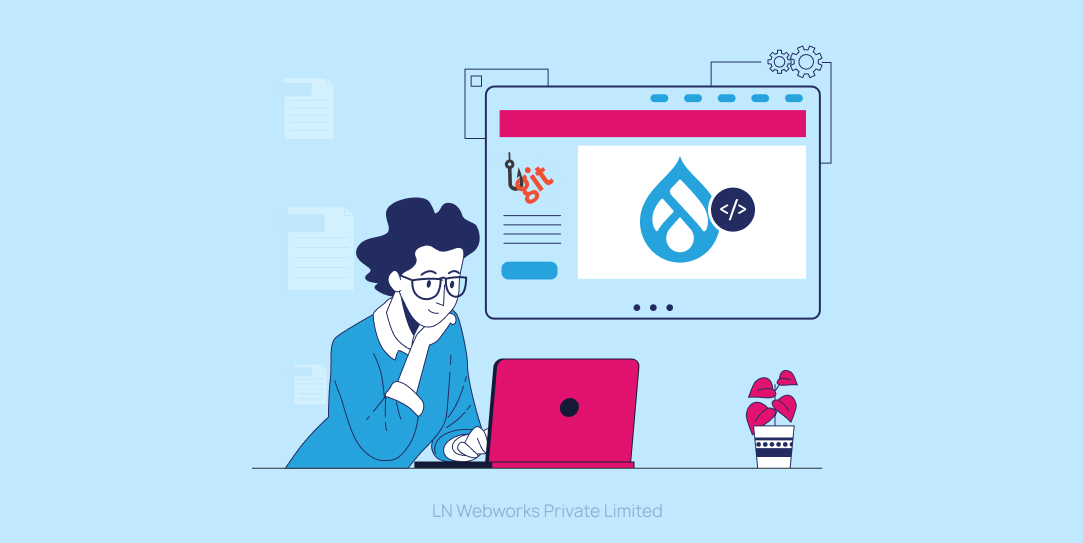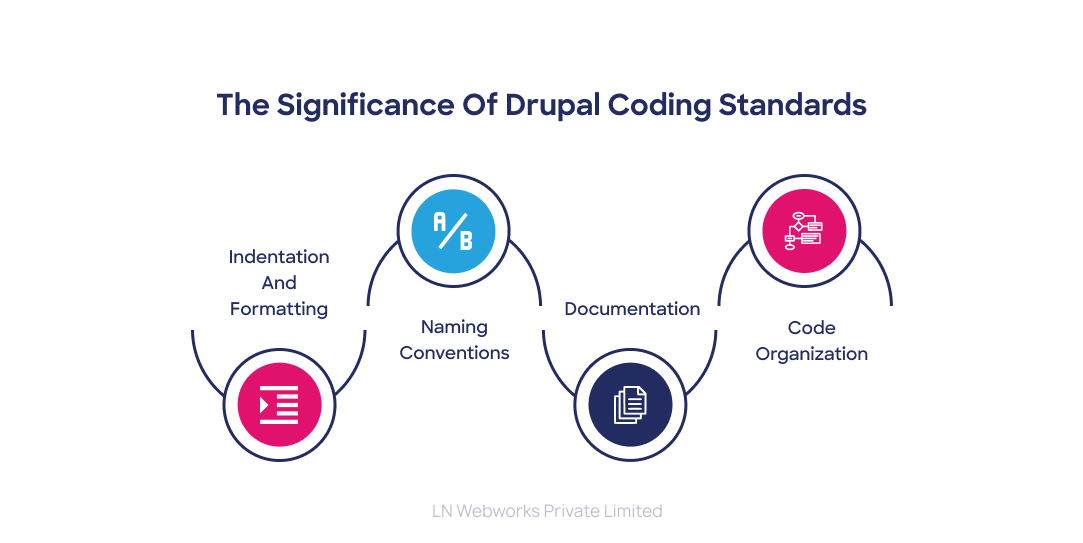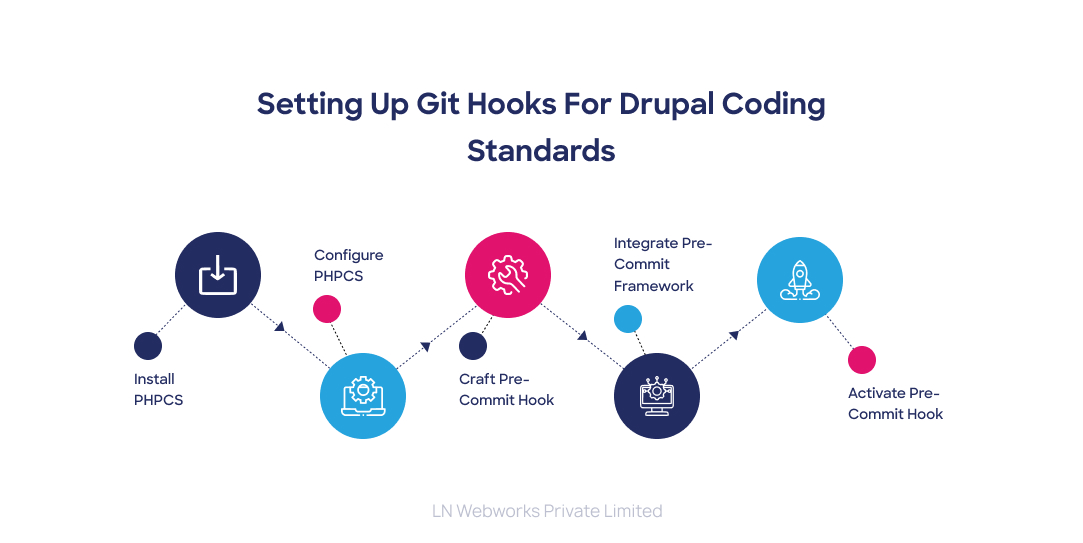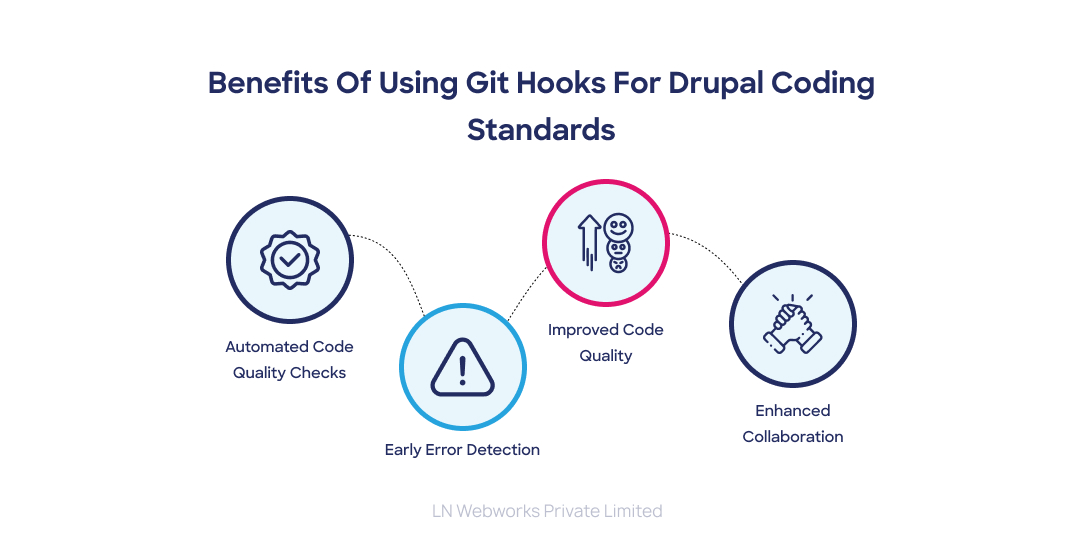Drupal Coding Standards with Git Hooks: All You Need To Know

Think of good code like a well-put-together puzzle—it’s strong, looks good, and is easy to tweak. When you’re coding with a team or diving into projects like Drupal, sticking to coding standards is a big deal. That’s where Git Hooks come in!
Git Hooks provides a simple and automated way to guarantee that your code consistently adheres to Drupal’s coding standards. By incorporating Drupal Coding Standards with Git Hooks, developers can effortlessly commit and push code that aligns with the community’s guidelines.
Let’s dive deeper into the world of Git Hooks to understand how they work and put them into action for smoother and more standardized coding practices.
The Significance of Drupal Coding Standards
Drupal’s coding standards encompass a set of guidelines for writing consistent, well-structured, and maintainable code. These standards cover various aspects of code development, including:

Indentation and Formatting
Proper indentation and formatting enhance code readability and make it easier to understand the structure of the codebase.
Naming Conventions
Consistent naming conventions for variables, functions, classes, and modules ensure clarity and avoid potential naming conflicts.
Documentation
Comprehensive documentation aids in understanding the purpose and functionality of code modules, facilitating future maintenance and development.
Code Organization
Organizing code logically and structure improves maintainability and makes it easier to navigate the codebase.
By adhering to Drupal coding standards, developers can:
- Enhance code readability and maintainability, making it easier for developers to understand and modify the codebase.
- Reduce code duplication and inconsistencies, promoting code reusability and quality.
- Facilitate collaboration among developers by ensuring a consistent coding style across the project.
- Improve code quality by identifying and correcting potential coding errors and inconsistencies early in the development process
Leveraging Git Hooks for Code Quality Enforcement
Git hooks provide a powerful mechanism for automating code quality checks and enforcing coding standards. Pre-commit hooks, in particular, are triggered before a commit is made, allowing developers to catch and rectify any coding standard violations in real time.
To implement pre-commit hooks for Drupal coding standards, developers can utilize tools like PHPCS (PHP CodeSniffer) and Git. PHPCS scans PHP code against a set of coding standards and rules, identifying potential violations. Git, on the other hand, provides the infrastructure for executing scripts at specific points in the workflow.
Before diving into the setup of Git Hooks: The following prerequisites
Git
This is a distributed version control system designed to track changes in source code.
Composer
Utilize Composer as your dependency management tool for PHP projects.
PHP CodeSniffer (PHPCS)
PHPCS serves as a tool for identifying coding standard violations in PHP code.
Drupal Coding Standards Ruleset
Ensure you have the Drupal coding standards ruleset, which outlines the specific coding guidelines to adhere to.
Setting Up Git Hooks for Drupal Coding Standards
To set up Git hooks for Drupal coding standards, follow these steps

Install PHPCS
Begin by installing PHP CodeSniffer (PHPCS) through your preferred method, whether it’s Composer or PEAR.
Configure PHPCS
Download the Drupal coding standards ruleset and configure PHPCS to align with these rules.
Craft Pre-commit Hook
Develop a pre-commit hook script designed to run PHPCS specifically on modified PHP files just before a commit.
Integrate Pre-commit Framework
Enhance your workflow by integrating a pre-commit framework like pre-commit.com. This framework efficiently manages and executes your pre-commit hook scripts.
Activate Pre-commit Hook
Seal the deal by enabling the pre-commit hook to run seamlessly before every commit.
Once the pre-commit hook is enabled, any code modifications that violate Drupal coding standards will be flagged before the commit is allowed. Developers can then review and rectify the errors before committing the code. Further,
Benefits of Using Git Hooks for Drupal Coding Standards
Employing Git hooks for Drupal coding standards enforcement offers several benefits:

Automated Code Quality Checks
Pre-commit hooks automate code quality checks, reducing the need for manual code reviews and ensuring consistent adherence to coding standards.
Early Error Detection
Identifying coding errors early in the development process prevents them from propagating into the codebase, saving time and effort in debugging and fixing issues later.
Improved Code Quality
Consistent enforcement of coding standards leads to overall code quality improvement, making the codebase more maintainable and readable.
Enhanced Collaboration
Shared coding standards promote collaboration among developers by ensuring a common coding style and reducing misunderstandings.
Let’s Wrap It Up!
Aligning Drupal coding standards with Git Hooks is like orchestrating efficiency and excellence in development. By automating code quality checks seamlessly, Git Hooks serves as guardians of a robust, visually appealing, and collaborative codebase. This alliance streamlines workflows, cultivates a culture of consistent adherence to Drupal’s coding best practices, and fosters early error detection.
For unparalleled success in your Drupal website, look no further than LN Webworks expert-driven drupal support and maintenance services. Contact us today to embark on your Drupal maintenance journey.